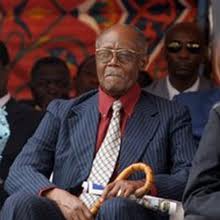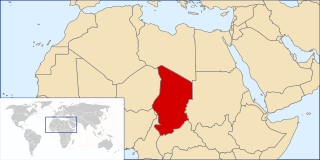Chad, officially the Republic of Chad, is a landlocked country in Central Africa. It borders Libya to the north, Sudan to the east, the Central African Republic to the south, Cameroon and Nigeria to the southwest, and Niger to the west. Due to its distance from the sea and its largely desert climate, the country is sometimes referred to as the "Dead Heart of Africa".

François Tombalbaye, also known as N'Garta Tombalbaye, was a Chadian politician who served as the first President of Chad from the country's independence in 1960 until his overthrow in 1975. A dictatorial leader, his divisive policies as president led to factional conflict and a pattern of authoritarian leadership and political instability that are still relevant in Chad today.
Goukouni Oueddei is a Chadian politician who served as President of Chad from 1979 to 1982.

FROLINAT was an insurgent rebel group active in Chad between 1966 and 1993.

Félix Malloum or Félix Malloum Ngakoutou Bey-Ndi was a Chadian military officer and politician who served as the second President of Chad from 1975 to 1978.

Chad was a part of the French colonial empire from 1900 to 1960. Colonial rule under the French began in 1900 when the Military Territory of Chad was established. From 1905, Chad was linked to the federation of French colonial possessions in Middle Africa, known from 1910 under the name of French Equatorial Africa. Chad passed in 1920 to French civilian administration, but suffered from chronic neglect.
The 1975 coup d'état in Chad that terminated Tombalbaye's government received an enthusiastic response in the capital N'Djamena. Félix Malloum emerged as the chairman of the new Supreme Military Council, and the first days of the new regime were celebrated as many political prisoners were released. His government included more Muslims from northern and eastern Chad, but ethnic and regional dominance still remained very much in the hands of southerners.
Ibrahim Abatcha was a Muslim Chadian politician reputed of Marxist leanings and associations. His political activity started during the decolonization process of Chad from France, but after the country's independence he was forced to go in exile due to the increasing authoritarism of the country's first President François Tombalbaye. To overthrow Tombalbaye he founded in Sudan in 1966 the FROLINAT, of which he was the first leader and field commander. Two years later he was killed in a clash with the Chadian Army.
Noël Milarew Odingar was a Chadian officer who briefly served as head of state and was later one of the nine members of the Supreme Military Council, the military junta that ruled Chad between 1975 and 1978.
The 1975 Chadian coup d'état was in considerable part generated by the growing distrust of the president of Chad, François Tombalbaye, for the army. This distrust came in part from the Chadian Armed Forces (FAT) incapacity to deal with the rebellion that was inflaming the Muslim north from when the rebel insurgent group FROLINAT had been formed in 1966.
Negue Djogo was a Chadian officer and politician.

The Chadian–Libyan War was a series of military campaigns in Chad between 1978 and 1987, fought between Libyan and allied Chadian forces against Chadian groups supported by France, with the occasional involvement of other foreign countries and factions.

Oueddei Kichidemi was the father of the former Chadian President Goukouni Oueddei and was the tribal leader, or derde, of the Toubou Teda of the Tibesti during the First Chadian Civil War.
Opération Bison was a French military operation in Chad from 1969 to 1972.
Chad achieved independence in 1960. At the time, it had no armed forces under its own flag. Since World War I, however, southern Chad, particularly the Sara ethnic group, had provided a large share of the Africans in the French army. Chadian troops also had contributed significantly to the success of the Free French Forces in World War II. In December 1940, two African battalions began the Free French military campaign against Italian forces in Libya from a base in Chad, and at the end of 1941, a force under Colonel Jacques Leclerc participated in a spectacular campaign that seized the entire Fezzan region of southern Libya. Colonel Leclerc's 3,200-man force included 2,700 Africans, the great majority of them southerners from Chad. These troops went on to contribute to the Allied victory in Tunisia. Chadians, in general, were proud of their soldiers' role in the efforts to liberate France and in the international conflict.

The Chadian Civil War of 1965–1979 was waged by several rebel factions against two Chadian governments. The initial rebellion erupted in opposition to Chadian President François Tombalbaye, whose regime was marked by authoritarianism, extreme corruption, and favoritism. In 1975 Tombalbaye was murdered by his own army, and a military government headed by Félix Malloum emerged and continued the war against the insurgents. Following foreign interventions by Libya and France, the fracturing of the rebels into rival factions, and an escalation of the fighting, Malloum stepped down in March 1979. This paved the way for a new national government, known as "Transitional Government of National Unity" (GUNT).
El-Hadj Abbo Nassour Abdoulaye Sabre was a Chadian politician. Born in a Northern family, he served in several ministerial functions before being jailed 1963. He was later released and returned to the political limelight 1969–1975.
Hadjé Halimé Oumar (1930-2001) was a Chadian activist, educator, and politician.
Kalthouma Nguembang was a Chadian politician, who was an early member of the Chadian Progressive Party (PPT). She was elected to the National Assembly of Chad in 1968, but was later imprisoned by François Tombalbaye who accused her of plotting against him.